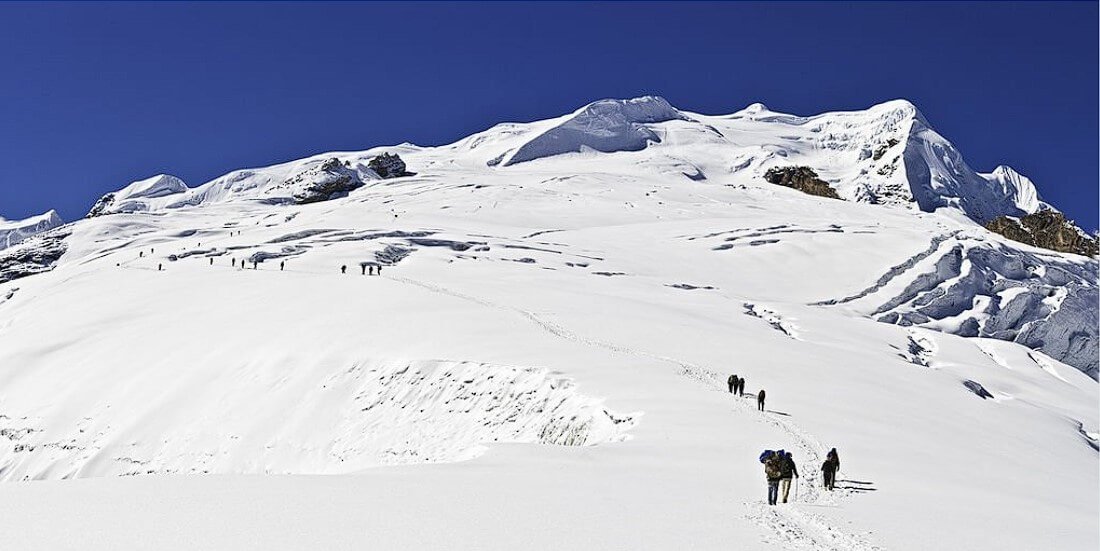Share This:

Mera Peak Climbing – Conquer Nepal’s Highest Trekking Peak with Mountain Treks Nepal
For adventure seekers looking to step beyond traditional trekking, Mera Peak Climbing offers the perfect gateway into the world of Himalayan mountaineering. Standing at an impressive 6,476 meters (21,247 ft), Mera Peak is the highest trekking peak in Nepal a climb that combines physical challenge, cultural immersion, and the unmatched grandeur of the Everest region.
Organized by Mountain Treks Nepal, this expedition provides a professionally guided, safe, and unforgettable journey through breathtaking landscapes, remote Sherpa villages, and towards the rooftop of the world.
Introduction: Why Mera Peak?
Unlike other technical climbs, Mera Peak is ideal for both seasoned trekkers and beginners with a good level of fitness who dream of summiting a Himalayan peak. Located in the Khumbu region, south of Everest, Mera offers panoramic views of five of the world’s highest mountains Everest (8,848m), Lhotse (8,516m), Makalu (8,463m), Cho Oyu (8,201m), and Kanchenjunga (8,586m).
The journey is not just about reaching the summit it’s about the incredible trek through unspoiled landscapes, the hospitality of local Sherpa communities, and the feeling of standing above the clouds surrounded by Himalayan giants.
With Mountain Treks Nepal, you get expert guidance, proper acclimatization, quality gear, and a team committed to making your Himalayan dream come true.
Mera Peak Climbing Itinerary Overview
A typical Mera Peak Climb organized by Mountain Treks Nepal takes about 18–20 days, allowing for gradual acclimatization and safe ascent.
Day 1: Arrival in Kathmandu (1,400m), trip briefing, and gear check.
Day 2: Fly to Lukla (2,860m) and trek to Paiya.
Day 3: Trek to Panggom (2,846m).
Day 4: Trek to Ningsow (2,863m).
Day 5: Trek to Chhatra Khola (3,150m).
Day 6: Trek to Kothe (3,691m).
Day 7: Trek to Thangnak (4,358m).
Day 8: Trek to Khare (5,045m).
Day 9: Acclimatization and pre-climb training at Khare.
Day 10: Trek to Mera High Camp (5,780m).
Day 11: Summit Day! Climb Mera Peak (6,476m) and descend to Khare.
Day 12–16: Return trek to Lukla via Zatrwa La Pass.
Day 17: Fly back to Kathmandu.
Day 18: Departure or leisure day in Kathmandu.
This itinerary ensures ample rest and acclimatization, reducing the risk of altitude sickness while maximizing your chances of summit success.
Key Highlights of Mera Peak Climbing

-
Summit Nepal’s highest trekking peak (6,476m) with expert support.
-
Spectacular aerial flight from Kathmandu to Lukla — one of the most scenic air routes in the world.
-
Panoramic views of five 8,000-meter giants from the summit.
-
Trek through ancient Sherpa settlements and unspoiled forest trails.
-
Experience the rich Buddhist culture of the Khumbu region.
-
Professional climbing guidance from Mountain Treks Nepal’s certified team.
Best Time for Mera Peak Climbing
The most favorable times to climb Mera Peak are:
-
Spring (March to May): Stable weather, blooming rhododendrons, and excellent visibility.
-
Autumn (September to November): Clear skies, crisp air, and perfect climbing conditions.
Winter climbs are possible for experienced mountaineers but can be extremely cold and challenging. Monsoon (June–August) is generally not recommended due to slippery trails and poor visibility.
Difficulty Level and Preparation
Mera Peak Climbing is classified as a non-technical climb, but it demands excellent physical fitness and endurance. The main challenges are altitude, cold, and long trekking days.
Physical Preparation Tips:
-
Engage in cardio exercises (hiking, cycling, jogging) for at least 2–3 months before the climb.
-
Train with a backpack to simulate real trekking conditions.
-
Include strength and flexibility exercises to improve stamina.
-
Mental readiness is key — embrace the adventure with determination and patience.
Before summit day, Mountain Treks Nepal conducts a pre-climb training session in Khare, where you’ll learn to use crampons, ropes, and ice axes under expert supervision.
Accommodation and Meals
Accommodation during the trek is a mix of local teahouses and tented camps at higher altitudes. Teahouses offer basic but cozy lodging with home-cooked Nepali meals and warm hospitality.
At high camp, you’ll stay in tents, surrounded by snow-capped peaks an unforgettable Himalayan experience!
Meals include Dal Bhat (traditional Nepali meal), soups, pasta, bread, eggs, tea, and coffee. Mountain Treks Nepal ensures hygienic and balanced nutrition throughout the journey.
The Sherpa Culture Experience
The Mera region is rich in Sherpa culture, deeply rooted in Buddhist traditions. You’ll encounter colorful monasteries, mani walls, and prayer flags fluttering across mountain passes.
Trekking with Mountain Treks Nepal gives you the chance to interact with local Sherpa families, learn about their mountain life, and experience the genuine warmth that defines Himalayan hospitality.
Permits and Regulations
To climb Mera Peak, you’ll need the following permits:
-
Mera Peak Climbing Permit (issued by NMA – Nepal Mountaineering Association)
-
Makalu Barun National Park Entry Permit
-
Local Area Permit (Rural Municipality)
All permits and logistics are handled efficiently by Mountain Treks Nepal, so you can focus on the adventure.
Equipment and Gear Checklist
Essential Items Include:
-
Mountaineering boots and crampons
-
Down jacket and sleeping bag (rated -20°C)
-
Ice axe, harness, and climbing helmet
-
Layered clothing system (base, mid, outer)
-
Trekking poles, gloves, gaiters, and sunglasses
-
Headlamp, water purification tablets, and personal medicine kit
Mountain Treks Nepal provides necessary climbing equipment and briefings before your ascent.
Summit Experience
Reaching the summit of Mera Peak (6,476m) is an indescribable moment a mixture of exhaustion, pride, and pure joy. As the first rays of sunlight illuminate Everest, Lhotse, and Makalu, the world below feels distant and dreamlike.
From the top, you’ll witness one of the most extensive Himalayan panoramas, a reward worth every ounce of effort.
The descent back to Khare feels triumphant every step filled with gratitude and awe.
Responsible & Sustainable Climbing
At Mountain Treks Nepal, we are committed to eco-friendly trekking and climbing. We promote “Leave No Trace” principles, minimize plastic use, and respect the natural and cultural heritage of the Himalayas.
Our expeditions support local communities through fair wages, locally sourced food, and community-based tourism initiatives.
By climbing with Mountain Treks Nepal, you become part of a sustainable effort to preserve Nepal’s mountains for future generations.
Testimonials
“Summiting Mera Peak with Mountain Treks Nepal was the highlight of my life! The guides were skilled, friendly, and made us feel safe at every step.”
— Lukas, Germany
“From Kathmandu to the summit, the entire journey was perfectly organized. The views from Mera were beyond imagination!”
— Priya, India
How to Book Your Mera Peak Climb
Booking your adventure with Mountain Treks Nepal is simple. Visit www.mountaintreksnepal.com to explore Mera Peak itineraries, pricing, and preparation guides.
Our expert team can tailor the trip according to your time, experience, and fitness level.
Why Choose Mountain Treks Nepal?
-
Over a decade of trekking and climbing experience across Nepal.
-
Certified guides and expert climbers ensuring your safety and success.
-
Custom itineraries with proper acclimatization and local engagement.
-
Affordable and transparent pricing no hidden costs.
-
A genuine commitment to sustainability and responsible tourism.
Final Thoughts
Mera Peak Climbing is not just an ascent it’s a personal transformation. From the moment you step into the Khumbu region, you’ll be captivated by the wild beauty, the warmth of the people, and the call of the mountains.
With Mountain Treks Nepal, every aspect of your climb from preparation to summit is handled with care, safety, and professionalism. Whether you’re chasing your first Himalayan summit or expanding your mountaineering experience, Mera Peak promises an adventure of a lifetime.
So pack your passion, lace your boots, and let Mountain Treks Nepal lead you to the top of Nepal’s highest trekking peak.
